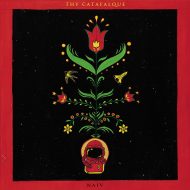 Thy Catafalque’s subliminal cuts – all weighed down with a suitably metal edge, of course – seem to have been propelling from relative cult status to more something more widely revered over recent albums. From sweet harmonies that wouldn’t go amiss on a 90s underground dance floor, tribal beats, Hungarian folk music, prog overloads and sweeping axe riffs that bludgeon or glide as needed, Thy Catafalque play hard and fast with the script like some sort of modern prog-rock version of Kraftwerk. Sole band member Tamás Kátai remains firmly at the centre of the lush, baroque explosions that now stamp a heady print on each album (four in the past five years).
Thy Catafalque’s subliminal cuts – all weighed down with a suitably metal edge, of course – seem to have been propelling from relative cult status to more something more widely revered over recent albums. From sweet harmonies that wouldn’t go amiss on a 90s underground dance floor, tribal beats, Hungarian folk music, prog overloads and sweeping axe riffs that bludgeon or glide as needed, Thy Catafalque play hard and fast with the script like some sort of modern prog-rock version of Kraftwerk. Sole band member Tamás Kátai remains firmly at the centre of the lush, baroque explosions that now stamp a heady print on each album (four in the past five years).
But there are at least a dozen artists featured here including a handful of vocalists, brass accompaniments, string solos from cello to violin and assorted traditional instruments such as the oud and the quena (a kind of bamboo flute from the Andes). It should be said too that keyboards play a major role – probably more prominent than any other Kátai Catafalque album to date. But it that’s going to put you off, then you really are on to a non-starter with this band. Anyone who’s been following things here will know the fundamental ingredients by now – all present here – but will also know that you need to go with the flow because whatever you were expecting before you put the needle on the record won’t be where you end up.
The aural feast sometimes propels itself towards outright metal folk cut with the bouncy 1990s crusty trance style of Ozric Tentacles (or indeed any other psychedelic space rockers you care to mention), at times like the tripped-out funky soundtrack from a chase scene in an Austin Powers movie, at others a sludge doom trawl. But of all his albums this one is perhaps the most unashamed at hitting the high notes – almost gratuitously so. After the appetite whetting first track, which pretty much picks up where the more melancholy-sweet Geometry left off, the following tracks take you back to the more racy, adrenaline-charged Sgùrr (four albums ago) via the local Hungarian disco and then into the grassy foothills and forests of his native lands (he splits his time and the recording and mastering of the album between Hungary and Scotland where he has also spent a lot of time) where tracks like Embersólyom and Kék madár (a track which probably helps justify my earlier Kraftwerk mention) are allowed to roam free.
This is undoubtedly the most exuberant of the recent albums – wandering with starry-eyed purpose through all of Kátai’s influences but with an unquestionable love of a life with purpose. One of the tracks translates as ‘countless colours’ – and I can think of few better descriptions. Although, like the album cover itself, against a dark background that’s probably not going to make this an accessible ride for many non-prog rock / folk metal fans. Indeed, we flip momentarily from airy ethereal moments to growled vocals – even if these are far less frequent here than previous albums. The moments of sublime joy are carefully crafted so you never quite find yourself chewing guiltily on sugar coated candy. Instead Naiv, for all its frollicks, remains a well-crafted cuisine. Much like 2018’s Geometry, there is a controlled consistency here.
For what it’s worth, the rush of Sgùrr – which blew me away one grey, rainy Autumn morning back in 2015, still lingers as my most cherished Thy Catafalque album. But that is likely a very personal choice – and there are plenty to choose from so I certainly wouldn’t begrudge or argue against any others. Naiv may well we make it for most people. Its full spectrum technicolour is not the most experimental or challenging of his works to date (challenging to listen to rather than to produce, that is – try Meta for that). But if you need a lift in 2020 that’s grounded in life’s meaningful moments, then stick this on. Thy Catafalque is on a roll.
(8.5/10 Reverend Darkstanley)

04/02/2020 at 12:43 am
For some reason, this album hasn’t grabbed me yet as much as the last one. Instead, I am really, really enjoying SMUTNICE from silent Streams of Godless Elegy. Not quite the “same” subgenre, but definitely shares an Eastern European folk backbone.